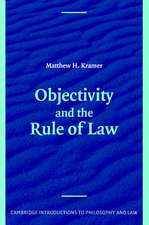The Ethics of Capital Punishment: A Philosophical Investigation of Evil and its Consequences
Autor Matthew Krameren Limba Engleză Paperback – 29 ian 2014
Preț: 352.92 lei
Preț vechi: 383.91 lei
-8% Nou
Puncte Express: 529
Preț estimativ în valută:
67.54€ • 73.34$ • 56.73£
67.54€ • 73.34$ • 56.73£
Carte disponibilă
Livrare economică 21-27 martie
Livrare express 15-21 martie pentru 66.97 lei
Preluare comenzi: 021 569.72.76
Specificații
ISBN-13: 9780199642199
ISBN-10: 0199642192
Pagini: 368
Dimensiuni: 156 x 236 x 20 mm
Greutate: 0.54 kg
Editura: OUP OXFORD
Colecția OUP Oxford
Locul publicării:Oxford, United Kingdom
ISBN-10: 0199642192
Pagini: 368
Dimensiuni: 156 x 236 x 20 mm
Greutate: 0.54 kg
Editura: OUP OXFORD
Colecția OUP Oxford
Locul publicării:Oxford, United Kingdom
Recenzii
Review from previous edition Hannah Arendt ends Eichmann in Jerusalem with a statement about the sentencing of Adolf Eichmann: "we find that no one, that is, no member of the human race, can be expected to want to share the earth with you." Kramer's excellent new book develops an original line of argument that echoes that Arendtian sentiment into what he calls the purgative justification for capital punishment....Kramer's book is a well-argued and inventive work that will generate new avenues of discussion in legal and moral philosophy
Matthew Kramer's book The Ethics of Capital Punishment is a significant achievement. Not only does it offer a thorough and up-to-date discussion of traditional justifications for the death penalty, it also attempts to offer an alternative, novel justification for it, something that Kramer calls the purgative rationale. Although I am not entirely sympathetic to this aim, I think that carving out a new territory within this already crowded intellectual space is something which ought to be commended
The book's provocative thesis, connecting moral philosophy with legal scholarship, will surely occupy a position of importance in ongoing debates within criminal law
In this bold philosophical inquiry, Professor Matthew Kramer develops a justification for the death penalty as a sui generis concept: the purgative rationale. After grappling with and rebutting the standard justifications for capital punishment deterrence, retributivism, incapacitation, and denunciation Professor Kramer develops the purgative rationale, arguing that a community is tainted in other words, its moral integrity is lessened by the continuing existence of anyone who has perpetrated some especially hideous crimes
Matthew Kramer's book The Ethics of Capital Punishment is a significant achievement. Not only does it offer a thorough and up-to-date discussion of traditional justifications for the death penalty, it also attempts to offer an alternative, novel justification for it, something that Kramer calls the purgative rationale. Although I am not entirely sympathetic to this aim, I think that carving out a new territory within this already crowded intellectual space is something which ought to be commended
The book's provocative thesis, connecting moral philosophy with legal scholarship, will surely occupy a position of importance in ongoing debates within criminal law
In this bold philosophical inquiry, Professor Matthew Kramer develops a justification for the death penalty as a sui generis concept: the purgative rationale. After grappling with and rebutting the standard justifications for capital punishment deterrence, retributivism, incapacitation, and denunciation Professor Kramer develops the purgative rationale, arguing that a community is tainted in other words, its moral integrity is lessened by the continuing existence of anyone who has perpetrated some especially hideous crimes
Notă biografică
Matthew H. Kramer is Professor of Legal & Political Philosophy at the University of Cambridge; Fellow of Churchill College, Cambridge; and Director of the Cambridge Forum for Legal & Political Philosophy. He is the author of a dozen previous books and the co-editor of four other books.
















